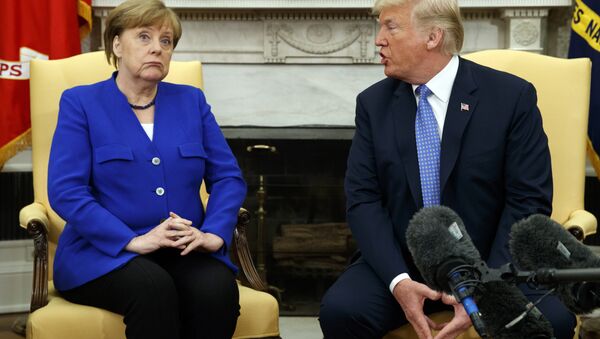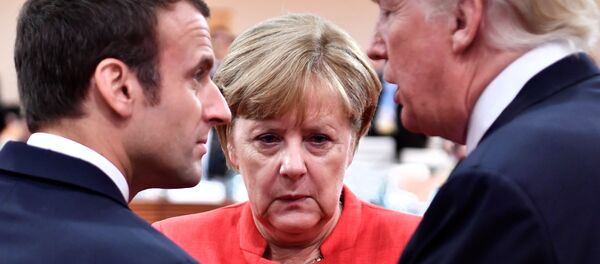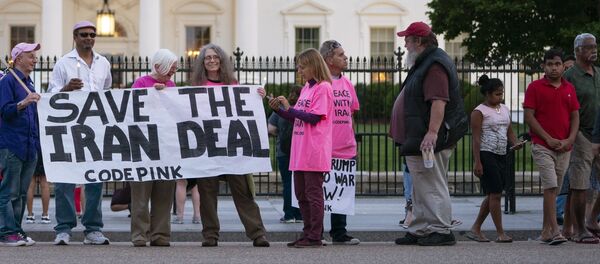Interviewed by Sputnik, several Iranian and Russian political analysts spoke about the impact Trump’s decision may have and how it could reflect on Tehran’s nuclear cooperation with Russia.
Iranian political scientist Mani Mehrabi said that the US withdrawal from the Iran nuclear deal was anticipated and is another US attempt to extract concessions from Tehran.
“The US sees the current world order as a place something where Washington is a guarantor of trade, financial and military organizations. Its foreign policy hinges on the principle of obtaining such privileges and benefits. JCPOA is not the only agreement the US has reneged on just overnight. He [Trump] earlier did this with the Paris climate accord, the 1949 North Atlantic agreement, the Trans-Pacific Partnership, the North American Free Trade Agreement (NAFTA) and UNESCO.
US Betrayed Itself
Hassan Beheshtipour, an expert in nuclear energy and a Press TV political commentator, believes that under the circumstances, Iran’s nuclear program will not be affected and its nuclear partnership with Russia will continue.
“By voting for Resolution 2231 the US betrayed itself, because JCPOA is part and parcel of this resolution by the UN Security Council. Therefore, its unilateral exit from this agreement flies in the face of international law. The US showed that it recognizes international legal norms only when they meet its interests. If not, it simply ignores them,” Beheshtipour said.
“That’s why even after the US withdrawal from JCPOA, our cooperation with Russia will not be halted and the construction of the new reactors for the Bushehr nuclear station will continue,” he emphasized.
Hassan Beheshtipour’s opinion was fully echoed by his Russian colleague Nikolai Kozhanov, an Iranian affairs expert at the European University in St. Petersburg.
“The Bushehr station has never fallen under any sanctions due to a US-Russian agreement that Washington would not slap sanctions on Rosatom and its subcontractors in exchange for Moscow’s cooperation on the Iranian nuclear agreement,” Kozhanov said.
He added that because Donald Trump differs very much from his predecessors, he hasn’t ruled out any punitive US moves against Rosatom.
“However, because Russia and the US have signed an agreement on cooperation in nuclear energy, Moscow could respond in kind, that’s why I think that Iran’s nuclear program remains under Russian protection,” he added.
Regarding renewed US sanctions on Iran and a possible response from the other members of the P5+1 signatories of the Iran nuclear deal, Kozhanov outlined three possible options.
Trump is Stalling
There will be “wind down” periods of 90 to 180 days for existing Iran contracts for companies working with Iran to roll up their cooperation with Tehran.
Hassan Mohammadi, an Iranian expert in nuclear energy, believes that Donald Trump will take his time.
“The 180 days Trump is talking about is a breather of sorts for himself, not for Iran or those who support JCPOA. Apart from Bahrain, Israel, Saudi Arabia no other country backed his decision. Iran’s allies, Russia and China, as well as the European countries that participated in the years-long negotiation on JCPOA, oppose it. Even Canada and Australia are against.”
“Trump is taking his time to see the countries’ reactions before he goes ahead with the sanctions. Without international support, the sanctions will simply not be working. Europeans, Russia and China consider Trump’s decision to withdraw from the agreement as rash and ill-advised, something they will not go for. That’s why I don’t think that anything serious is going to happen,” he added.
The Iran nuclear agreement, known as the Joint Comprehensive Plan of Action (JCPOA,), signed by Tehran and the five permanent members of the UN Security Council – the US, France, Britain, Russia and China – plus Germany on July 14, 2015, imposes strict restrictions on Iran's nuclear program in return for the loosening of economic sanctions.
READ MORE: France Wants to Defend EU Firms From US Sanctions on Iran — French Minister
President Donald Trump has repeatedly threatened to pull out of the JCPOA unless Congress and America's European allies "fix" it with a follow-up accord.
Iran has always denied pursuing a nuclear weapon and accuses Israel of stirring up world suspicions against it.





